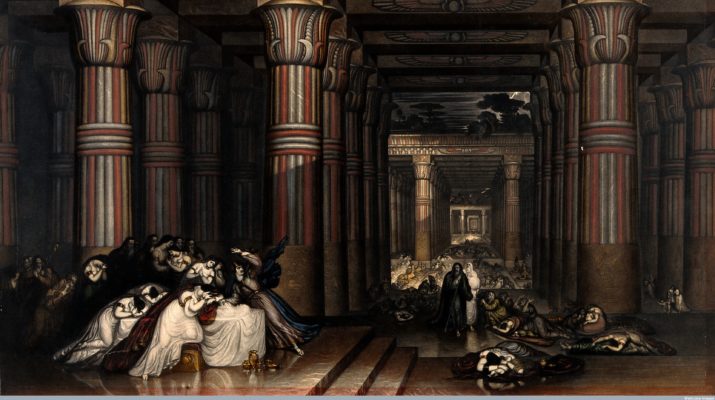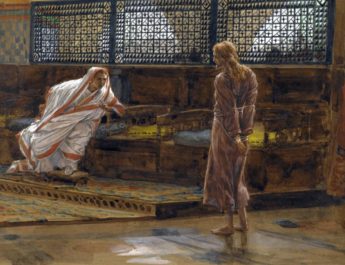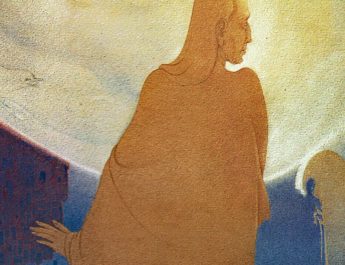Exodus 11
1 The LordA said to Moses,B “I will bringC oneD more
A “Lord” = YHVH. From havah (to be, become) or hayah (to come to pass, become, be). This is the name of the God of Israel, the self-existent and eternal one, the tetragrammaton. This pronunciation has been lost to time so “Lord” is generally used in its place.
B “Moses” = Mosheh. From mashah (to pull out in a literal or figurative sense, to draw out) OR from Egyptian mes or mesu (child, son i.e. child of…). This is Moses – the one drawn out from the water, which is to say, rescued. If derived from the Egyptian, his name would share a root with Rameses and Thutmose.
C “bring” = bo. This is to enter, come in, advance, fulfill, bring offerings, enter to worship, attack. It can also have a sexual connotation.
D “one” = echad. Perhaps from achad (to unify, continue on a path; figuratively, to gather one’s thoughts). This is the number one, first, united. It can also be alone, altogether, a certain, a few.
plagueE upon PharaohF and upon Egypt;G
E “plague” = nega. From naga (touch, reach, arrive, come near, strike; touching for any reason including sexual or violent). This is a blow or stroke, wound, sore, mark plague. It can refer to someone with leprosy or to dress.
F “Pharaoh” = Paroh. From Egyptian pr (palace, pharaoh; literally house + great). This is Pharaoh, a title for Egyptian kings. See https://en.wiktionary.org/wiki/pharaoh
G “Egypt” = Mitsrayim. Perhaps from matsor (besieged or fortified place, bulwark, entrenchment; something hemmed in; a siege or distress or fastness); from tsur (to confine, besiege, to cramp). This is Egypt.
afterwardsH he will let you goI from here; indeed, when he lets you go,J he will drive you away.K
H {untranslated} = ken. Perhaps from kun (properly, in a perpendicular position; literally, to establish, fix, fasten, prepare; figuratively, it is certainty, to be firm, faithfulness, render sure or prosperous). This is to set upright. Generally used figuratively to mean thus, so, afterwards, rightly so.
I “let…go” = shalach. This is to send out, away, send for, forsake. It can also mean to divorce or set a slave free.
J {untranslated} = kalah. From kalah (to end, be finished, complete, prepare, consume, spent, or completely destroyed). This is completion, destruction, end, consummation.
K “indeed…drive…away” = garash + garash. This is to cast out or expel. It can be to exile someone or to divorce them. The word is repeated twice – the first time as an Infinitive Absolute. The Infinitive Absolute serves to emphasize the sentiment of the word. It is rather like Foghorn Leghorn’s speech pattern, “I said, I said.”
2 TellL, M the peopleN that every manO is to askP his neighborQ and every womanR
L “tell” = dabar. This is generally to speak, answer, declare, or command. It might mean to arrange and so to speak in a figurative sense as arranging words.
M {untranslated} = na + ozen. Na is used for requests or for urging. It can be we pray, now, I ask you, oh. This is the same “na” in “hosanna.” Ozen is ear, hearing, audience, show. Properly, it is broadness – applied to its ear in reference to its shape.
N “people” = am. From amam (to darken, hide, associate; creating shadows by huddling together). This is people or nation. It can be used specifically for a tribe, collectively of troops or armies, or figuratively to refer to a flock of animals.
O “every man” = ish. Perhaps from enosh (human, humankind, mortal); from anash (to be weak, sick, or frail). This is man, husband, another, or humankind.
P “ask” = shaal. This is to ask, inquire, beg, borrow, desire, request. It can also mean to demand.
Q “neighbor” = rea. From raah (to associate with). This is the same as neighbor in Leviticus 19:18 “love your neighbor as yourself.” This is friend, companion, fellow, neighbor. It is someone with whom you associate, whether more or less close.
R “every woman” = ishshah. Related to “every man” in v2. From ish (see note O above). This is woman, wife, or female.
is to ask her neighborS for objectsT of silverU andV gold.”W
S “neighbor” = reuth. Related to “neighbor” in v2. 6x in OT. From raah (see note Q above) OR from ra’ah (to tend a flock, pasture, or graze; to rule or to associate with someone; figuratively, ruler or teacher); {akin to rea (see note Q above)}. This is a female neighbor, a mate, another.
T “objects” = keli. Related to {untranslated} in v1. From kalah (see note J above). This is something that was prepared – any implement, utensil, article, vessel, weapon, or instrument. Also includes jewels, weapons, bags, carriages, and furniture.
U “silver” = keseph. From kasaph (to long for, be greedy; to become pale). This is silver or money.
V {untranslated} = keli. Same as “objects” in v2. See note T above.
W “gold” = zahab. Root may mean to shimmer. This is gold or something that has the color of gold like oil. It can also refer to a clear sky – to good weather.
3 The Lord gaveX the people favorY in the sightZ of the Egyptians.AA Moreover, Moses himself was a man of great importanceBB in the landCC of Egypt, in the sight of Pharaoh’s officialsDD and in the sight of the people.
X “gave” = natan. This is to give, put, set, offer. It is to give literally or figuratively.
Y “favor” = chen. From chanan (beseech, show favor, be gracious; properly, to bend in kindness to someone with less status). This is grace, favor, kindness, beauty, precious.
Z “sight” = ayin. This is eye in a literal or figurative sense so eye, appearance, favor, or a fountain (the eye of the landscape).
AA “Egyptians” = Mitsri. Related to “Egypt” in v1. From the same as Mitsrayim (see note G above). This is Egyptian.
BB “great importance” = gadol + meod. Gadol is from gadal (to grow up, become great, become wealthy – to advance. The root meaning may be to twist in the sense of the process of growing). This is great, high, bigger, noble, old, marvelous. It can also refer to someone who is powerful or distinguished. Meod is perhaps from the same as uwd (firebrand, a poker). This is very, greatly, exceedingly. It can also mean vehemence, force, abundance.
CC “land” = erets. Root may mean to be firm. This is earth, ground, field land, or country.
DD “officials” = ebed. From abad (to work, serve, compel; any kind of work; used causatively, can mean to enslave or keep in bondage). This is a servant, slave, or bondservant.
4 Moses said, “Thus says the Lord: About midnightEE I will go outFF throughGG Egypt. 5 EveryHH firstbornII in the land of Egypt shall die,JJ
EE “about midnight” = chastot + layil. Chatsot is 3x in OT. From chatsah (to halve, divide, reach, participate). This is middle or division. Layil is properly, this refers to light twisting away. It is used for night or midnight. Figuratively, this can mean adversity.
FF “go out” = yatsa. This is to go or come out, bring forth, appear. It is to go out in a literal or figurative sense.
GG “through” = tavek. This is among, middle, in the midst, the center. Perhaps, properly, to sever.
HH “every” = kol. From kalal (to complete). This is all or every.
II “firstborn” = bekor. From bakar (to bear fruit, be firstborn, firstling, that which opens the womb, give the birthright to). This is firstborn or chief.
JJ “die” = mut. This is to die in a literal or figurative sense. It can also refer to being a dead body
from the firstborn of Pharaoh who sitsKK on his throneLL to the firstborn of the female slaveMM who is behind the handmill,NN and allOO the firstborn of the livestock.PP
KK “sits” = yashab. This is to sit and so to remain and so to dwell. It is sitting for any reason – as a judge, in order to ambush, or just sitting quietly. Causatively, this can mean settling or marrying. This can also mean continue, endure, or establish.
LL “throne” = kisse. From the same as kese (full moon); perhaps from kasah (to cover, conceal, overwhelm; to cover as clothes do or to hide a secret). This is throne – a seat that is covered or has a canopy. Thus, it is a seat that conveys authority.
MM “female slave” = shiphchah. Root may mean to spread out – it would be the same root used in mishpachah, which means family or clan. This is maidservant, female slave, or female bondslave.
NN “handmill” = recheh. 5x in OT. Root might mean to pulverize. This is a hand mill or a millstone.
OO “all” = kol. Same as “every” in v5. See note HH above.
PP “livestock” = behemah. This is animal or cattle. It is often used of large quadrupeds.
6 Then there will beQQ a loudRR crySS throughout the wholeTT land of Egypt, such as has never been or will ever be again.UU
QQ “be” = hayah. Related to “Lord” in v1. See note A above.
RR “loud” = gadol. Same as “great importance” in v3. See note BB above.
SS “cry” = tseaqah. From tsaaq (to cry out or call together, to shriek; by implication, calling for an assembly). This is a cry for help, shriek or outcry.
TT “whole” = kol. Same as “every” in v5. See note HH above.
UU “be again” = yasaph. This is to add, increase, continue, exceed.
7 But not a dogVV shall growlWW at anyXX of the IsraelitesYY
VV “dog” = keleb. This is yelping or attacking. It can also refer to a dog or it can be a term used for a male prostitute.
WW “growl” = charats…lashon. Charats is 12x in OT. This is to cut, sharpen, decree, wound, be alert, move. It can also be to decide or determine. Lashon is This is tongue, talker, language, or wedge. It can also be a tongue of flame or a water cove.
XX “any” = kol. Same as “every” in v5. See note HH above.
YY “Israelites” = ben + Yisrael. Literally, “children of Israel.” Ben is from banah (to build or obtain children). This is son, age, child. It is son in a literal or figurative sense. Yisrael is from sarah (to persist, exert oneself, contend, persevere, wrestle, prevail) + el (God or god). This is Israel, meaning God strives or one who strives with God; new name for Jacob and for his offspring. This refers to the people and to the land.
—not at people,ZZ not at animalsAAA—so that you may knowBBB that the Lord makes a distinctionCCC betweenDDD Egypt and Israel.
ZZ “people” = ish. Same as “every man” in v2. See note O above.
AAA “animals” = behemah. Same as “livestock” in v5. See note PP above.
BBB “know” = yada. This is to know, acknowledge, advise, answer, be aware, be acquainted with. Properly, this is to figure something out by seeing. It includes ideas of observation, recognition, and care about something. It can be used causatively for instruction, designation, and punishment.
CCC “makes a distinction” = palah. 7x in OT. This is to distinguish in a literal or figurative sense. It can also be to sever, set apart, or show self to be marvelous.
DDD “between” = bayin. From bin (to discern, consider, attend to; distinguishing things in one’s mind or, more generally, to understand). This is among, between, interval.
8 Then all these officials of yours shall come downEEE to me, and bow lowFFF to me, saying, ‘LeaveGGG us, you and all the peopleHHH who followIII you.’
EEE “come down” = yarad. This is to go down, descend; going down in a literal or figurative sense. It can be going to the shore or a boundary, bringing down an enemy.
FFF “bow low” = shachah. This is to bow down, make a humble entreaty, to do homage to royalty or to God.
GGG “leave” = yatsa. Same as “go out” in v4. See note FF above.
HHH “people” = am. Same as “people” in v2. See note N above.
III “follow” = regel. This is foot, endurance, or journey. It is a foot as the means of walking and so it implies a step or a greater journey. It can be used euphemistically for private parts.
After thatJJJ I will leave.” And in hotKKK angerLLL he left Pharaoh.
JJJ “that” = ken. Same as {untranslated} in v4. See note H above.
KKK “hot” = chori. 6x in OT. From charah (to be displeased, burn with anger, glow, become warn; figuratively a blaze of anger, zeal, or jealousy). This is burning, fierce, strong anger.
LLL “anger” = aph. From anaph (to be angry; properly, breathing hard as a signifier of being enraged). This properly refers to the nose or nostril and by extension the face. It can specifically refer to anger or wrath as one breathes hard and nostrils flare in times of great anger.
9 The Lord said to Moses, “Pharaoh will not listenMMM to you, in order that my wondersNNN may be multipliedOOO in the land of Egypt.”
MMM “listen” = shama. This is to hear, call, consent, or consider. It implies listening intelligently, giving attention, and, because of these two factors, obedience and action are often implied.
NNN “wonders” = mophet. Perhaps from yaphah (to be beautiful, decorate; root means being bright, which implies being beautiful). This is a wonder, miracle, symbol, sign, or omen.
OOO “be multiplied” = rabah. This is increasing in any aspect whether quantity, authority, size, quality, greatness, etc.
10 Moses and AaronPPP performedQQQ all these wonders beforeRRR Pharaoh; but the Lord hardenedSSS Pharaoh’s heart,TTT and he did not let the people of IsraelUUU go out of his land.
PPP “Aaron” = Aharon. Derivation uncertain. May mean “bearer of martyrs” OR be related to Ancient Egyptian ꜥḥꜣ rw (warrior lion) OR elevated, exalted, high mountain. This is Aaron. See https://en.wiktionary.org/wiki/Aaron
QQQ “performed” = asah. This is to make, do, act, appoint, become in many senses.
RRR “before” = paneh. From panah (to turn, face, appear). This is face in a literal or figurative sense. It could be face, presence, anger, respect. It can also be used of God to indicate divine favor or presence.
SSS “hardened” = chazaq. This is to strengthen, seize, be courageous, repair, bind, heal, conquer, harden.
TTT “heart” = leb. May be related to labab (to encourage; properly, to be encased as with fat; used in a good sense, this means to transport someone with love; used in a bad sense, it can mean to dull one’s senses). This is the heart, courage, one’s inner self, the mind, or the will. Heart is only used in a figurative sense in the Old and New Testaments.
UUU “people of Israel” = ben + Yisrael. Same as “Israelites” in v7. See note YY above.
Image credit: “The killing of the Egyptian firstborn by God” by John Martin, 1836.




